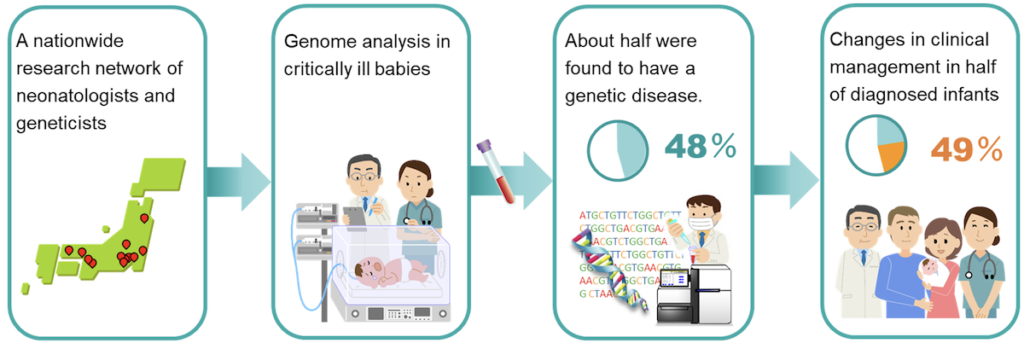Precise and rapid genetic diagnosis and treatability for Infants (Priority-i)
-
Confirming Genome Analysis as a Viable Diagnostic Tool in Pediatrics: diagnosing medical cause in approximately half of 85 neonatal cases
[2021-03-29] The Penmark – A monthly round-up of Keio news and research
Background
Up to 10% of critically ill neonates who are admitted to the neonatal intensive care unit have treatable genetic conditions. However, it is often challenging for pediatricians to make accurate diagnosis because of lack of disease-specific symptoms during the early infancy.
Objectives
This study aims to provide a rapid and precise genetic diagnosis of newborns admitted to the neonatal intensive care unit who are likely to have a genetic cause. We achieve this goal by combining the latest comprehensive genetic analysis and omics analysis.
Achievements
A total of 17 advanced perinatal care centers in Japan formed a nationwide research network of neonatologists and geneticists (primary investigator: Toshiki Takenouchi, MD, PhD at Keio University School of Medicine, Tokyo, Japan).
Using a new method called genome analysis, we attempted to determine the cause of 85 severely ill babies for whom the cause could not be determined using conventional testing methods. As a result, about half of the babies (41 babies) were found to be suffering from a genetic disease that they were born with. In about half (20) of the patients who were found to have genetic diseases, there were changes in clinical management including tests and treatment plans.

The results of this research have been published online in The Journal of Pediatrics on February 4, 2022.
Suzuki H, Nozaki M, Yoshihashi H, Imagawa K, Kajikawa D, Yamada M, Yamaguchi Y, Morisada N, Eguchi M, Ohashi S, Ninomiya S, Seto T, Tokutomi T, Hida M, Toyoshima K, Kondo M, Inui A, Kurosawa K, Kosaki R, Ito Y, Okamoto N, Kosaki K, Takenouchi T, Genome analysis in sick neonates and infants: high-yield phenotypes and contribution of small copy number variations, The Journal of Pediatrics (2022), doi: https://doi.org/10.1016/j.jpeds.2022.01.033.


